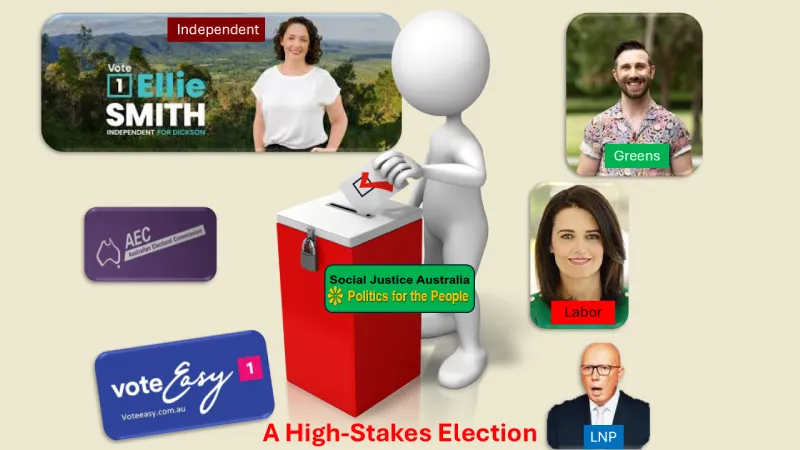Description
The Dickson electorate matters because it could reshape Australian politics. Is it time to break the two-party grip? Discover the candidates and what’s at stake.
Introduction: A High-Stakes Election

Picture this: It’s election night, and all eyes are on Dickson. The seat, held by Peter Dutton since 2001, has become a battleground that could decide Australia’s political direction. But this election isn’t just about Dutton—it’s about whether Australians continue supporting a broken two-party system controlled by corporate interests or electing independents who represent them.
As Australians grow increasingly disillusioned with politics as usual, the Dickson electorate provides a microcosm of this frustration. With five candidates in the running—Vinnie Batten (Greens), Peter Dutton (Liberal National), Ali France (Labor), Suniti Hewett (Family First), and Ellie Smith (TEAL Independent)—the choice is more than just left vs. right. It’s about who serves the people and who serves vested interests.
The Candidates: Who Stands for What?
Vinnie Batten (Greens)
Key Policies: Climate action, renewable energy, social equity
• Advocates for rapid decarbonisation and a just transition to clean energy.
• Supports expanding Medicare, rent caps, and free higher education.
• Wants to tax billionaires to fund social services.
Peter Dutton (Liberal National)
Key Policies: National security, corporate tax cuts, privatisation
• Has a hardline stance on immigration and law enforcement.
• Opposes stronger climate policies, supporting fossil fuel expansion.
• Prioritises tax cuts for businesses over expanding public services.
Ali France (Labor)
Key Policies: Healthcare, education, infrastructure
• Supports increased funding for hospitals, schools, and public transport.
• Backs progressive tax reforms but is limited by party discipline.
• Problem: Labor MPs must vote along party lines, even if it conflicts with voters’ needs.
Suniti Hewett (Family First)
Key Policies: Christian values, anti-LGBTQ+, anti-abortion, pro-Trump
• Focuses on conservative social policies, restricting reproductive rights and opposing marriage equality.
• Publicly expresses staunch support for Donald Trump and aligns with his style of populist right-wing politics.
• Advocates for policies prioritising “traditional family values” and opposing progressive social movements. Key Policies: Christian values, anti-LGBTQ+, anti-abortion
• Focuses on conservative social policies, restricting reproductive rights and opposing marriage equality.
Ellie Smith (TEAL Independent)
Key Policies: Political integrity, climate action, economic fairness
• Committed to fighting corruption and advocating for campaign finance reform.
• Supports a carbon-neutral economy and stronger worker protections.
• Unlike major party candidates, she can vote independently based on electorate concerns.
Peter Dutton’s Record: Controversy and Corporate Interests
Peter Dutton’s extensive career in parliament is filled with controversy and policies favouring corporations over everyday Australians. Additionally, you may find this video interesting (The Baddest MP).
P.S. SCD Remanufacturing mentioned in “The Baddest MP” has been sold to or taken over by (Advanced Manufacturing Queensland) AMQ.
Key Controversies:
• 2009 Insider Trading Allegations: Bought bank shares before a government bailout announcement.
• Boycotted the Apology to the Stolen Generations (2008): Later admitted he made a mistake.
• Offshore Detention: A key architect of Australia’s widely condemned asylum seeker policies.
• Paladin Contract: Paladin Group was awarded $423 million in government contracts to provide security services for offshore detention centres on Manus Island.
Voting Record:
• Climate Change: Opposed net-zero targets, renewable energy expansion.
• LGBTQ+ Rights: Voted against same-sex marriage.
• Public Services: Supports further privatisation, reducing public health and education funding.
• See how Dutton votes on issues important to most voters.
LNP’s record when last in government.
The Two-Party System: Controlled by Vested Interests
Australia’s two-party system has been hijacked by corporate lobbyists, making real change impossible.
How Major Parties Serve Big Business:
• Liberal & Labor accept millions in donations from banks, mining companies, and developers.
• Policies often reflect donor interests rather than public needs.
• Issues like housing affordability, wage stagnation, and healthcare reform are ignored in favour of corporate-friendly policies.
Punter’s Politics has many videos highlighting how corporations are ripping off Australians, seemingly with government support.
Another great site is Michael West Media. They have many articles and videos that show how the government is failing the voters and corporations are taking our resources, often for free.
Why Labor Can’t Always Represent Voters:
• Labor MPs must vote with the party, limiting local representation.
• Even well-intentioned candidates like Ali France are bound by party discipline.
• True independence is only possible outside the major party system.
Breaking the Two-Party Grip: Why Independents Matter
The rise of Independents and minor parties presents a real opportunity for change.
Benefits of Electing Independents:
• Freedom to vote in the electorate’s best interest rather than party policy.
• Pushes major parties towards accountability and political reform.
• Encourages diverse representation in parliament, breaking the cycle of corporate influence.
Case Studies of Successful Independents:
• Helen Haines (Independent – Indi): Leading advocate for a national integrity commission.
• Jacqui Lambie (Independent Senator – Tasmania): Championed veterans’ rights and fought against unfair welfare cuts.
• Zali Steggall (TEAL Independent – Warringah): Played a pivotal role in pressuring government action on climate change.
• David Pocock (Independent Senator – ACT): Successfully negotiated improvements to workplace laws, secured better cost-of-living relief measures, and pushed for stronger environmental protections. Pocock has advocated for transparency and political accountability, particularly in addressing corporate influence in policymaking.
Conclusion: A Crossroads for Dickson and Australia
The Dickson electorate matters. It will test whether Australians are ready to challenge the two-party status quo. Voters must decide:
• Do they re-elect Peter Dutton, whose record favours corporations over citizens?
• Do they choose a Labor candidate constrained by party loyalty?
• Or do they take a stand, breaking the duopoly by electing more Independent and smaller parties?
A vote for an Independent or minor party isn’t wasted—it’s a direct challenge to the political system that has failed everyday Australians.
Q&A: Common Reader Questions
1. Is voting for an Independent a wasted vote?
No. Independents and minor parties have gained absolute power in parliament, forcing major parties to be more accountable.
2. What happens if Independents win more seats?
It shifts power away from party machines towards elected representatives who serve their communities directly.
3. How do we break the two-party system?
By consistently voting for credible Independents and minor parties, prioritising people over corporate donors.
Call to Action: Be Part of the Change
If you found this article insightful, explore more on political reform and Australia’s monetary sovereignty at Social Justice Australia. :https://socialjusticeaustralia.com.au/
Share this article with your community to help drive the conversation toward a more just and equal society.
Click on our “Reader Feedback”. Please let us know how our content has inspired you. Submit your testimonial and help shape the conversation today!
Additionally, leave a comment about this article below.
Support Social Justice Australia – Help Keep This Platform Running
Social Justice Australia is committed to delivering independent, in-depth analysis of critical issues affecting Australians. Unlike corporate-backed media, we rely on our readers to sustain this platform.
If you find value in our content, consider making a small donation to help cover the costs of hosting, maintenance, and continued research. No matter how small, every contribution makes a real difference in keeping this site accessible and ad-free.
💡 Your support helps:
✅ Keep this website running without corporate influence
✅ Fund research and publishing of articles that challenge the status quo
✅ Expand awareness of policies that affect everyday Australians
💰 A one-time or monthly donation ensures Social Justice Australia stays a strong, independent voice.
Thank you for being part of this movement for change. Your support is truly appreciated!

